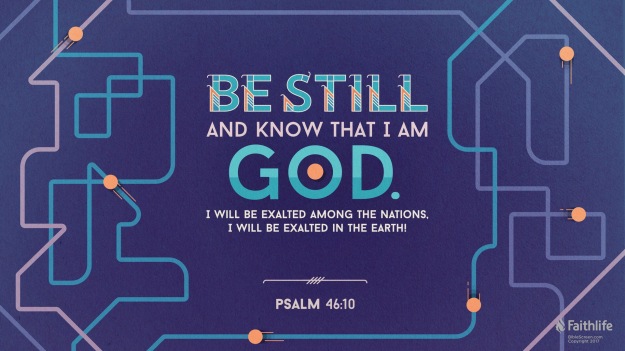
10 The psalmist goes on to encourage the godly to “know” that the Lord is God. Though it was tempting to ally themselves with foreign powers, to rely on military strength, or to give themselves over to idolatry and pagan ways, the godly must learn to persevere to the end. The exhortation “be still” calls on them to stop doing one thing in favor of something else. What their temptation was may be implied from v. 2: “Therefore we will not fear.” Throughout the history of Israel and Judah, severe national distress brought the temptation to abandon true religion for the ephemeral security of political alliances, military strength, and worldly paganism. Instead of choosing a negative option, the people of God distinguish themselves by the pursuit of godliness: “Know that I am God.” The knowledge of God includes factual knowledge about him, his past acts, and his promises. But in this context, the psalmist calls on them to commit themselves to the Lord and to seek his “refuge,” “strength,” and “fortress” (vv. 1, 7, 11). The life of faith is lived continually in commitment to God’s sovereignty, rule, and ultimate exaltation over all the nations (cf. Hab 2:13–14). So Levenson, 154, writes, “In Jerusalem, there is peace and bliss” (see Reflections, p. 733, Yahweh Is the Divine Warrior).[1]
46:10 The voice of God rings out to all the inhabitants of the earth in accents of assurance and supremacy. “Be still, and know that I am God; I will be exalted among the nations, I will be exalted in the earth!” Every fear is stilled, every anxiety quieted. His people can relax. He is God. His cause is victorious. He is supreme among the nations, supreme over all the earth.
It is from verse 10 that Katharina von Schlegel, the author of the hymn “Be Still, My Soul” drew inspiration.
Be still, my soul; thy God doth undertake
To guide the future as He has the past.
Thy hope, thy confidence let nothing shake;
All now mysterious shall be bright at last.
Be still, my soul: the winds and waves still know
His voice who ruled them while He dwelt below.[2]
46:10 Cease striving and know that I am God. These twin commands to not panic and to recognize His sovereignty are probably directed to both His nation for comfort and all other nations for warning.[3]
46:10 Be still The term raphah means “to release” or “let go” (37:8; Job 27:6). God commands the forces of chaos (Ps 46:2–3) and the nations (v. 6) to stop their raging and recognize Him as God (2:10–12).[4]
46:10 Be still. In the true knowledge of God and His deliverance there is peace, in contrast with the troubled “nations” (v. 6).[5]
[1] VanGemeren, W. A. (2008). Psalms. In T. Longman III & D. E. Garland (Eds.), The Expositor’s Bible Commentary: Psalms (Revised Edition) (Vol. 5, p. 407). Grand Rapids, MI: Zondervan.
[2] MacDonald, W. (1995). Believer’s Bible Commentary: Old and New Testaments. (A. Farstad, Ed.) (p. 622). Nashville: Thomas Nelson.
[3] MacArthur, J. F., Jr. (2006). The MacArthur study Bible: New American Standard Bible. (Ps 46:10). Nashville, TN: Thomas Nelson Publishers.
[4] Barry, J. D., Mangum, D., Brown, D. R., Heiser, M. S., Custis, M., Ritzema, E., … Bomar, D. (2012, 2016). Faithlife Study Bible (Ps 46:10). Bellingham, WA: Lexham Press.
[5] Sproul, R. C. (Ed.). (2005). The Reformation Study Bible: English Standard Version (p. 777). Orlando, FL; Lake Mary, FL: Ligonier Ministries.
